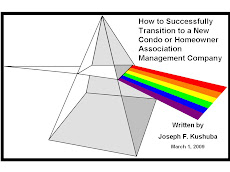Leaders of the past almost always seem more effective than those of today. It's a perceptual bias: We long for what we don't have, and mythologize what we used to have. But even taking this bias into consideration, many of today's condo/HOA leaders don't seem to measure up to the expectations of their members. .
Our parents talk about former leaders of their day that not only inspired confidence, but respect and reverence as well. They talk about Roosevelt, Churchill, Eisenhower, Gandhi, and others of that generation as larger than life figures. Our generation often includes the likes of John and Robert Kennedy, Martin Luther King, Margaret Thatcher, Ronald Reagan, Mikhail Gorbachev, and others. Sure they had their flaws, but they were courageous and decisive, and could communicate in ways that made it clear what they stood for.
So, where have all the good leaders gone? "They're out pleading, trotting, temporizing, putting out fires, trying to avoid too much heat or legal problems, trying to please everyone, and trying to keep all of this in balance with their personal live that is impacted through this volunteer position. They're peering out a landscape of bottom lines, multiple personal preferences and expected entitlements that often put them in the category of "hired help" or "landlords" by their constituents." They resign. They burn out. They decide not to run or serve.These leaders of today have to navigate a "very slippery slope" and operate in an environment that has changed significantly over the recent years, including:
- First, the velocity and volume of issues that Condo/HOA leaders are confronted with today has increased substantially. This doesn't mean that the previous generations of leaders had it easy; rather they had more time between decisions than leaders have today. Now, with the advent of instantaneous communication within and across the members, leaders have very little time to think. Most of them are inundated with information and overwhelmed with meetings. They move from one issue to the next with frequent interruptions as new developments occur. Relaxed time to think, reflect, and plan is limited and fragmented. But leaders who don't find ways to carve out that quality time reduce their effectiveness.
- A second reason for the diminished confidence might be that many of today's Condo/HOA leaders are overly concerned with the reactions of their stakeholders. This may sound odd, since a key function of leadership is to tune in to the needs of the people they are leading. Listening, however, only goes so far, particularly when the many voices do not agree. At some point leaders need to declare their intentions, even if not everyone will be happy. For this reason today's Condo/HOA leaders often hesitate to do what they think is right. Instead they seem to base their policies on polling trends, or about the reactions of influential members within the association. In contrast, respected leaders drive towards a longer-term vision and find ways to handle the speed bumps along the way.
We can begin with accepting that fact that each of us can make a difference and begin by changing ourselves first. We can become an effective leader by developing and enhancing our own leadership abilities. We can begin by learning how to lead ourselves first, then by becoming an example to others.
One of the most important skills and a good first place to start is improving our decision making skills. Association leaders are constantly required to evaluate alternatives and make choices regarding a wide range of issues that impact their association. Therefore, it goes without saying that successful leaders are good decision makers. That doesn’t necessarily mean that they only make good decisions, but rather that they can make bold, timely decisions, and they are not afraid to make adjustments along the way, as needed. They place a high priority on being fast and not necessarily always being 100% right. Although you may think it is risky to make a quick, and possibly incorrect, decision, the reality is that timeliness is crucial in today’s ever changing and equally challenging environment for any business, including an association.









